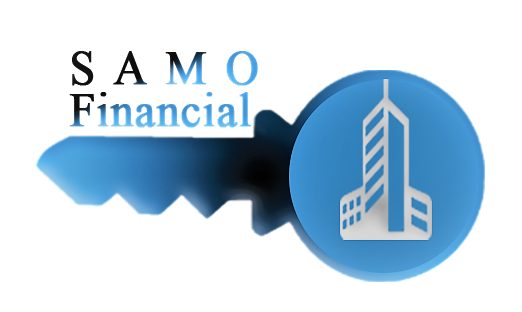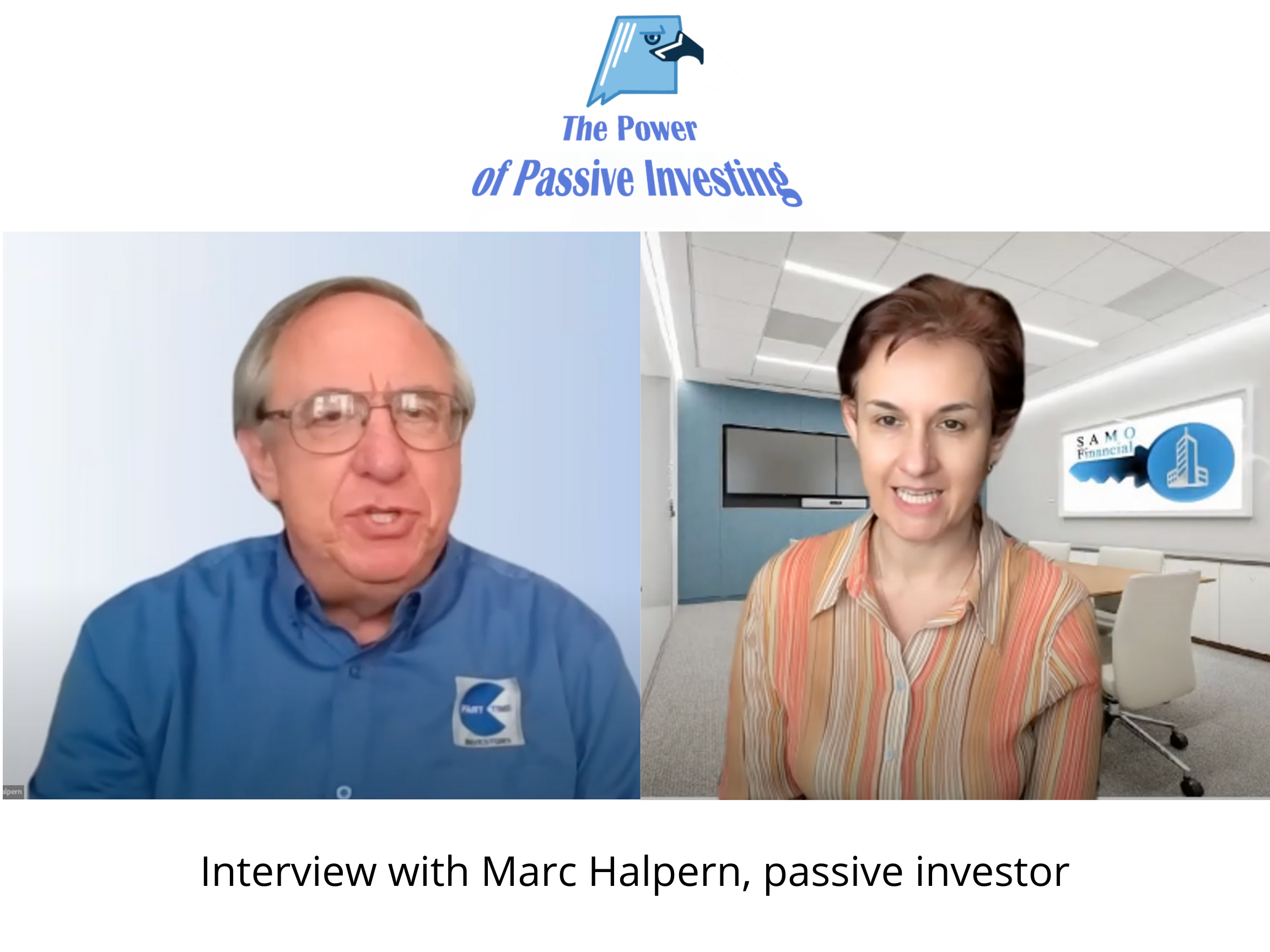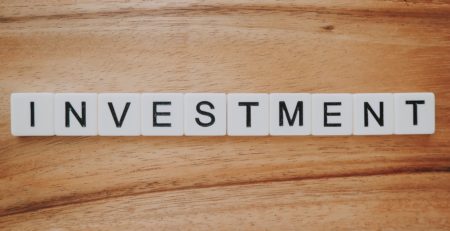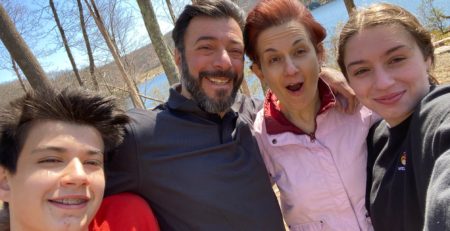Interview with a passive investor
Alina Trigub2023-10-17T15:40:38+00:00How to be a successful part-time investor
Alina
Hello and welcome everyone to this 2022 edition of the SAMO Financial interviews. Today we’re interviewing one of our investors Marc Halpern, who in addition to being one of the investors with us, is also a very well known chemist, he is also a part time real estate investor. I will ask Marc to tell us a little bit about his background and a little history about him and his family so you can get an idea of all of the qualifications and books and materials that Marc has produced in the past. So Marc, please go ahead.
Marc
Okay. Well, thank you very much Alina, thank you very much for inviting me. I’m happy to be an investor with the Tempo group and it’s really an honor to meet you and be able to be interviewed by you as well. So let me just give a little bit of background about myself. I haven’t decided what I want to be when I grow up. So my prime occupation is a chemist. I’m an expert in the field of phase transfer catalysis. I’ve saved companies over $200 million. I stopped counting about 10 years ago. And I’ve provided services on site, actually physically there in 300 cities and 39 countries and I’ve written four books on this field to phase transfer catalysis. You can see a couple of books there in the picture. But that’s not the reason why we’re here today because you guys will fall asleep and have a lost time accident or safety incident if you bang your head against the table if I talk about phase transfer catalysis.
So I am a part-time investor and I guess my focus is that I’ve achieved financial freedom by doing only one or two real estate deals per year. Initially, I started like most real estate investors starting from zero with the usual single-family home rentals, and flip houses options, but then I branched out into notes and private lending. And then in a later stage, started investing out of the single-family home rentals and apartments indications, a land development funding resort and even farming more recently, and of course, I just now also made an investment in the Tempo Growth Fund, which I think is really great. In addition to that, I also do private equity precious metals. One of the things that I invested in is a company called Ultra Clean Fuel. We might cover that a little bit later. And I’m also a national speaker on part-time investing. I think I’m the only national speaker who deliberately focuses exclusively on part-time strategy. I love my occupation too much in phase transfer catalysis to ever want to be a full-time investor. I do have a 25-hour home study course called the Smarter Investing home study course that focuses on full-time income from part-time investing. I’ve also written two books on real estate investing, one is called Which Real Estate Investment Strategy is Best For You. I cover the four primary real estate investment strategies and the three secondary real estate investment strategies, which you can get for free on our website, parttimeinvestors.com. And I also wrote another book called We Buy Houses Sometimes.
Alina
Wow, Marc, I mean, just wow was such an intense and extensive biography, I feel like we need four separate interviews to cover each of the aspects that you just barely mentioned in 60 seconds while covering your biography. But I guess let’s dive into these small pieces that we can today and you know, we’ll potentially have a follow-up interview to talk about other pieces as well. So can you tell us a little bit about what are the most important characteristics of becoming a successful part-time investor?
Marc
Yes, that’s a very crucial question. I’m really glad you asked that. So there are several things. It isn’t just as if life were very simple, and you can have like one key, but actually, there are several of them. First, I guess one of the most important things is to be very efficient. If you’re gonna be a part-time investor, time is crucial. So we have to be extremely efficient with our resources. And our resources, there are four resources. There’s time, which is very efficient, money, taxes, and expertise. So you sort of need to be efficient in all of those.
Now, you don’t have to have a PhD in organic chemistry to do this. Obviously, most people don’t know, they are not chemists. 🙂 It certainly helps because being efficient is something that we do. There’s a lot of analysis in order to have the breakthroughs that I’ve had. So I’ll just sort of mention those and I’ll elaborate a little bit. So again, we want to be very efficient in terms of resources, time, money, taxes, and expertise. We also always want to buy at a deep discount. Let me go back, to the way that I do part-time investing, and people do part-time investing in different ways, the way that I do it, and the way that I also do my coaching, is to achieve financial freedom by doing only one to two real estate deals per year. And you can always find one to two real estate deals per year, I mean even in this market, which is a tough market now it’s 2022 and you can always find a deal, and what the deal means is getting them at a deep discount. Now discount can mean many things. It could be a distressed property, but it could also be some of the things that I’m more familiar with, such as Tempo Growth Fund as opposed to the other funds, where you know, you take some things like undervalued industrial assets, converting them to storage or the hotels that are not being utilized, and convert them to affordable housing, and I’ve seen other other ways of repositioning things that are underutilized. But in order to be efficient, in order to get a deep discount, it’s absolutely crucial to do deep due diligence. This is really, really crucial. So in order to be a successful part-time investor, we need to learn a bunch of things, but all these things are learnable okay, I mean, I’m a chemist there is nothing in chemistry that prepared me to look at a balance sheet or performance statements. You can look at these things, you don’t need a degree in accounting or business or anything like that. I don’t have any of those degrees. I have a degree in chemistry and that’s it. And anybody with common sense, some intelligence, and the desire to be successful as a part-time real estate investor or part-time investor in general, will always do a deep due diligence, which means if there’s let’s say private placement memorandum, you read every word, okay, well, it’s 50 pages or 70 pages.
Okay, you read it, they’re written in English, and most of us are semi-literate. So we can use reading comprehension skills reasonably so you read everything about it. You look at the numbers, you look at the location, you look at whatever other geographic factors there are, and then until you get convinced, not with 100% probability of success plus there is no such thing as 100%. But with enough due diligence, you can collect enough data to make sure that with a 90% probability of success 90-95%, this is a good deal in the case of Tempo Growth Fund, for example, which is, which is I don’t know how many deals are on now, probably about 15, I’m guessing. With a variety of apartment complexes and conversions of hotels and things like that, you feel comfortable with the fundamentals of the deal. Another very important thing is you want to feel extremely comfortable with the team. And again, this is not a commercial for Tempo Growth Fund. Actually, you might not like the fact that I’m talking about it so much, but I have to say I’m extremely impressed with you, and everybody else on the team. So I have a tremendous amount of confidence in this team. And for people when they join as investors you get these updates that really are very, extremely detailed. There’s this pretty transparent and, and that’s the kind of due diligence. So when I do deep due diligence, we also can do the deep discount, but it’s also very important to be efficient with resources. So with time and maybe I’m not sure if there’s something you’ve been asked later on, but as I transitioned from self-managed real estate, what I was doing, you know, my own rentals and flips and lease options, I was always looking for off-market deals. So I was doing the prospecting. I was going on MLS and I was doing postcard campaigns and all this, but now I’m a bit older and I have more resources and I like to be more passive, so now I want to outsource the finding of the off-market deals. So that’s why when you do deep due diligence on a fund, and I’m invested in several funds, and there are land development funds, and I’m invested in apartment complexes in Atlanta, Panama City, Florida and some of the more recent things I’ve done is a farm in Paraguay or Hilton resort in Belize. So in all these cases, I’m doing the deep due diligence on the fundamentals of the fund but also on the fund managers and the syndicators.
So all these things are very, very important. So now, I’m much more efficient with my time because I’m outsourcing the finding of the deals to prospecting for the motivated sellers and distressed properties or distressed sellers whatever the case may be.
In terms of money, then of course I want to be very efficient. That’s why you want to have a deep discount. And what’s really nice about deep discounts is let’s say you’re buying a property and, like the one we went into, we just went into Belize at about 40% of fair market value, which is really good. That means the property and there’s gonna be some money that’s gonna be put into some renovation but a lot of it is ready to go. So what happens is the market would actually have to fall 30-40-50% to break even, in this case, 60% just to break even. So that’s why it’s a lot less riskier and I’m not saying your risk goes up as your risk, but it’s a lot less risky. When you do your deep due diligence to get to the point we have a 90-95% confidence level that this may be a good thing.
And in terms of taxes and I mean, it’s my money so I can talk about what I do. I’m not soliciting for anybody, but I do invest a lot of Roth. Actually recently, on parttimeinvestors.com I talked about how I built a million-dollar self-directed 401k and invested in things that generate passive income. It generates enough passive income, and I’m over 59 and a half, it generates enough passive income that it covers our household expenses for my wife and me. So that’s really good. That means in addition to the active work that I do in chemistry, and I have other investments in real estate outside of my 401k then, you know, we’re actually doing quite well. So when it comes to the efficiency of money, taxes are extremely important.
Actually last night I was in a webinar from somebody else and they were talking about the 1031 exchange where you defer, defer, defer and die. Well, if my money is invested in Roth, and the money that I have invested with the Tempo Growth Fund is my Roth money, then I don’t have to worry about the tax ramifications, at least until they unless they get rid of the Roth, so I think the sort of summarize the key points to be successful as a part-time investor, and not necessarily part-time real estate investor, because I also invest in other things like the stock market and you know, private equity and precious metals and looking at the crypto although I’m not really sure yet about that because there’s a lot of funny business that goes on there.
So I think the key is to be extremely efficient with resources, which is time, money, taxes, and your expertise. Do deep due diligence because all we’re talking about is one to two deals a year so you can afford to do a few hours of deep due diligence and do due diligence to make sure that the fund managers are good and the fundamentals of the deal or deals are good so that you can always buy at a deep discount. I think those are my key factors for being successful as a part-time investor, while holding down a full-time occupation. I’m not retired, I’m still doing chemistry. I have business all over the world right now in you know Germany and Israel and even a little bit in the United States.
Alina
Excellent, very nice. Yeah, Marc, for people like you. I’m not sure if you would be willing to completely retire at some point. You always seem like the type of person who always needs to be engaged in something, whether it’s learning, educating yourself, or doing some sort of research.
Marc
Thank you. In fact, I will never retire. It’s funny, I was teaching my grandson, who is seven and a half years old, CashFlow 101, which is a great game. He’s seven and a half, even though it says from ages 14 and up, and he understood that when your passive income exceeds your routine expenses, you can retire. He says, “Oh, so is that why grandma retired, but you’re not retired?”
Then before I got a chance to say anything, he said “Oh, it’s because you love your job” and I said, “That’s right”. So I love what I do in phase transfer catalysis. It’s much more interesting than anything I do as a part-time investor. So I will never retire, but I’ll be doing phase transfer catalysis until I die.
Alina
And it shows, and it shows. Yeah, you have a very smart seven-year-old grandson. So kudos to you and your kids for raising such an intelligent kid. I’m grateful for you to mention Tempo Growth Fund and since you mentioned that, in addition to running my own company, SAMO Financial, I’m also head of Investor Relations for the TF management group and that’s where Marc invested with us into the Tempo Growth Fund. You also mentioned that as a part of your ongoing strategy, you also look at your investment and look at how much time you’re spending. I know you said that you started with single families or where you were more engaged, now your preference is to invest in something that is a lot more passive, like Tempo Growth Fund and other funds as well, which makes perfect sense, as it gives you more time for other things in general. But let’s talk about slightly different deals. I understand that you’ve invested in a private equity deal with a company called Ultra Clean Fuel. Can you tell our listeners a little bit about this investment?
Marc
Yep. So thank you for asking about that. So yeah, it’s a private equity deal sort of like a shark tank deal except we’re not looking at towels you can use at the beach or you know some other way of, you know, pouring milk into a container. In general private equity, you know, when you reach a certain… Let’s put it this way, when, in my never humble opinion, I don’t have humble opinions, because of my genetics and where I was raised. In my opinion, when you hit a certain net worth, you can afford to do something called High-Risk High Return, but that’s not exactly high risk. When I invested back the first 50,000 I put into it several years ago it was much earlier stage. But what Ultra Clean does is the tagline it cleans the world’s fuels. And there’s a certain there’s all kinds of, and we’re talking about fuels that are in the market right now, obviously like diesel, humongous, humongous market, I mean absolutely humongous, and even though these things are gonna be replaced in 30 or 40 years by hydrogen or ammonia. Now that’s going to clean the world’s fuels. What Ultra Clean does is they clean the world’s fuels, take out things like sulfur from diesel and all the amount of hydrocarbons and dissolved nitrogen and all kinds of things that cause pollution and I was first invited to do some work for hire on this project years ago. And I did and it took us about a year. We have a very, very small team. And it took us about a year to develop the technology and get enough for the patents. I later found out that actually just a couple of years ago I found out that a Saudi Arabian company invested more than $150 million trying to solve this issue. So what we have is we have the best technology that is protected by patents. We’re also getting additional patents right now. And this is to basically clean up fuels. The most important part is that it’s low cost. We have the lowest cost technology out there and we have the highest performance technology out there. And we have the lowest carbon footprint. So the combination of all these things to address, fuels right now that go into cargo ships. You can’t put solar on a cargo ship, it’s just not going to work or a truck or a bus, you know, solar or wind. These things are just too big or jet fuel. So we clean up all these kinds of fuels, other types as well. So we clean them up with again very low cost and when I say low cost, we’re on that low operating capital, sorry, low operating costs and low capital expenditures. So these are really good. I’ve been involved myself in the development. I’m actually one of the two people on the key patents and I was, I did the work for hire. But a few years ago, I learned that they were actually doing a capital raise. So I said, “Can I invest?” They said, “No we don’t invest”. And I said, “No, no, I want to invest”. So I put money in at first $50,000 and then I put in another 40 years at the time it was 50 Australian dollars. So I took a total of $90,000 in this and it is basically when you do private equity or like Shark Tank deals, so you should invest in what you know, or you should invest in things that you can understand that you can learn. And this is not the technology itself. It is organic chemistry and phase transfer catalysis. So people are pretty clear about that. By the way, we use hydrogen peroxide as the oxidant. So the only byproduct is water. So that’s you know, that’s a very good thing. And we basically you know, fuels in the last few and some just some public information that just came out is that there’s now a memorandum of understanding with a Canadian company to build a plant to process 15,000 barrels per day. We actually had a plant in New Mexico that actually demonstrated 1000 barrels per day so this is not pie-in-the-sky technology sometime in the future. This is stuff that’s happening right now. And what I will say is I am not soliciting investment. I’m not in charge of investor relations. But if anybody does want more information about this they can contact me at Marc at parttimeinvestors.com that’s Marc, M-A-R-C, and I can put you in contact with the people that are in charge of Investor Relations for Ultra Clean but it’s it’s a really good for me, it was an excellent investment. Of course, my due diligence was built in because I already knew the technology. But the markets are there and I’m very very excited about it. And you know we’re expecting really, really good returns but again, I am not soliciting here. If people have any questions whatsoever whether it’s about phase transfer catalysis or whatever they’re doing, whatever part-time investing you’re doing, and especially the transition from self-managed rentals, because when you get to a certain age, and you say you know what I don’t want to I want to manage tenants anymore. You know, COVID I don’t want to deal with them. Eviction moratorium, let other people like Mike, let them find the deals in Indianapolis and all these other places are in Belize or Atlanta wherever it is in Paraguay. Let them do that kind of stuff. So any questions about the transition from being a self-managed part-time investor like I was to a kind of accredited investor with more than a million dollars worth of just 401k money invested in various things? Please feel free to contact me at Marc at parttimeinvestors.com.
Alina
Excellent thank you Marc. This was a phenomenal interview. I’m really grateful for all the wisdom that you’ve provided to our listeners. And I want folks to be able to reach out so thank you for sharing your information, putting it up on the screen. I put my contact in the chat for those that would like to see but again, Marc’s personal website is parttimeinvestors.com. His chemistry website is phasetransfercatalysis.com as you can see, you can reach Marc through either one of the websites. Marc, any important thoughts as a part-time investor for folks that are starting out their investing journey right now?
Marc
Yes, part-time investing is absolutely the best way to invest. There is the absolute best way. It is an outstanding way for people who have a job whether they love their job or they hate their job, to not only achieve financial freedom but also achieve the kind of life that they want the life by design, which is why I also have my programs on howtobehappier.com and notbehappier.com. Happiness is most important, but health is of course number one, but with part-time investing, you can go as I did, I mean I wasn’t. On my 30th birthday, I was going to the federal poverty level, my wife and myself, and my son. Part-time investing is what got us to true financial freedom, and true passive income and you graduate through various stages. You start with the small stuff, and then you graduate to like where I’m at right now. I still have a couple of single-family rentals, but a lot of what I’m doing right now is part-time investing with the funds. So the main comment is part-time investing is a great way to live your life. It’s a great way of getting a vehicle to get up to full-time investing. Part-time investing is a really good way to come down off full-time investing by having financial freedom to achieve simultaneous happiness and prosperity.
Alina
That’s excellent. And ending comment thank you so much again, Marc. You can also find me on social media, whether it’s Facebook or LinkedIn, or rather several social media handles that I’m not going to mention. But anyway thank you so much again Marc for the interview, it was amazing. And for those that didn’t have a chance to listen, we are recording this, so you will have a chance to listen to the recording. Thank you and have a great day. Bye bye.
Marc
Thank you so much Alina for the opportunity.
Have you thought about passively building your wealth via real estate investing?
Let’s talk











